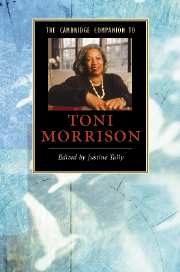Book contents
- Frontmatter
- Introduction: “All necks are on the line”
- Part I Toni Morrison’s fiction
- 1 The Bluest Eye and Sula: black female experience from childhood to womanhood
- 2 Song of Solomon and Tar Baby: the subversive role of language and the carnivalesque
- 3 Beloved or the shifting shapes of memory
- 4 Jazz and Paradise: pivotal moments in black history
- 5 The Morrison trilogy
- 6 Love and the survival of the black community
- 7 The artistic impulse of Toni Morrison’s shorter works
- Part II Toni Morrison’s criticism and editing
- Part III Essays
- Part IV Further Reading
- Index
4 - Jazz and Paradise: pivotal moments in black history
from Part I - Toni Morrison’s fiction
Published online by Cambridge University Press: 28 January 2008
- Frontmatter
- Introduction: “All necks are on the line”
- Part I Toni Morrison’s fiction
- 1 The Bluest Eye and Sula: black female experience from childhood to womanhood
- 2 Song of Solomon and Tar Baby: the subversive role of language and the carnivalesque
- 3 Beloved or the shifting shapes of memory
- 4 Jazz and Paradise: pivotal moments in black history
- 5 The Morrison trilogy
- 6 Love and the survival of the black community
- 7 The artistic impulse of Toni Morrison’s shorter works
- Part II Toni Morrison’s criticism and editing
- Part III Essays
- Part IV Further Reading
- Index
Summary
Jazz
Toni Morrison might be considered an “author's author” for her willingness to discuss the process through which her works develop. She shares with her readers the impetus behind each novel's origin, disclosing how the artistic mind transforms memories, folklore, and other works of literature into potent, compelling, and highly individualistic texts. As is the case with Beloved, which was prompted by her unearthing documentation regarding a slave woman who murdered her child to prevent it from being enslaved, both Jazz (1992) and Paradise (1998) were set into motion by similar literary finds. A photograph of a young Black girl in her coffin, taken by James Van Der Zee and reprinted in a collection of his funereal photography entitled The Harlem Book of the Dead, for which Morrison wrote the foreword, provided the impetus for a novel set in 1926, precisely the year in which the photograph was taken. In an interview with Gloria Naylor, Morrison explained how the girl, at a party, refused to tell anyone why she was suddenly very weak and bleeding, saying only, “I'll tell you tomorrow,” thereby enabling her lover, who had shot her, to escape safely. The incident haunted Morrison because, in her words, “a woman loved something other than herself so much. She had placed all of the value of her life in something outside herself.” In this novel, then, Morrison again interrogates the devastation caused by love. As she wrote earlier, in The Bluest Eye, “Love is never any better than the lover. Wicked people love wickedly, violent people love violently, weak people love weakly, stupid people love stupidly.” Her major characters in Jazz, Joe and Violet Trace and Dorcas Manfred, are neither wicked, nor violent, nor weak, nor stupid, but they do carry the trauma of orphaned childhood made more devastating by the racial terror to which they have borne witness.
- Type
- Chapter
- Information
- The Cambridge Companion to Toni Morrison , pp. 59 - 74Publisher: Cambridge University PressPrint publication year: 2007
- 2
- Cited by

